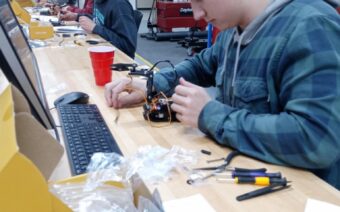
July 25, 2023
APPLETON – In response to a nationwide shortage of meat industry workers, Fox Valley Technical College (FVTC) in Appleton is doing its part to “meat” the challenge head-on.
Starting full force in the fall, FVTC is offering an eight-credit certificate created to help train skilled workers for the meat industry.
“As with many things in our society, during the COVID-19 pandemic, a weakness in the supply chain was discovered (in the meat industry),” FVTC culinary instructor Jeff Igel said. “We had these animals ready to go into the supply chain that couldn’t be processed.”
From there, Igel said an initiative was started by meat industry leaders.
“They said, ‘We need more hands and more people,’” he said. “Somewhere along the line – I don’t know the whole story – it got to our Legislature, and our governor said, ‘We have to do something about this.’”
Getting off the ground
That something came in the form of an announcement from Gov. Tony Evers and the Wisconsin Department of Agriculture, Trade and Consumer Protection (DATCP) – pledging up to $5 million in state funding to be used, in part, to attract and provide financial support to students interested in meat processing training programs.
“When it got to my desk, I think FVTC was already a bit late to the game,” Igel said. “I was asked, ‘Do you want to participate?’ I said, ‘Why wouldn’t we? We have the facilities, we have the talent and we have the space.’”

Jeff Igel has taught at FVTC for 27 years. Photo Courtesy of FVTC
DATCP Secretary Randy Romanski visited the college about a year ago to learn more about FVTC’s program and tour the learning labs where students will get hands-on training.
“The visit with Randy Romanski went wonderfully – he loved the setup,” Igel said.
From there, Igel said he visited about eight area butcher shops to get ideas on what they saw as being needed and how the program should be set up.
“After chatting with the butcher shops, we came up with the program,” he said. “Because FVTC already offers a couple of classes dealing with the meat industry – Meat Identification and Sanitation for Food Service Operations – it made even more sense to offer the certificate.”
Igel, who has been with FVTC for 27 years, said an online course – Livestock Essentials – and a pair of meat fabrication internships (144 hours each) were added to fulfill the requirements.
“Some schools had to start from scratch – that wasn’t our case,” he said. “All of (the colleges) do it a bit differently – FVTC doesn’t feel we have to be the same as others.”
Because the certificate is funded by the DATCP grant, Igel said as long as students meet the requirements of the class/program, it’s offered to them at no cost.
“I would hope (the initial $5 million grant) would last for a couple of years, at least,” he said. “I don’t know what will happen after that – maybe another grant. It’s an example of one pot of money with lots of people drawing out of it.”
Igel said he is aware of a school that had to back out of the program because of logistics.
“They would have had to build the lab to host classes,” he said. “You can’t cut meat at room temperature – you have to cut meat in about a 38-degree setting. All we had to do was get a bit more equipment – knives and a few other things.”
First go-around
Igel said even though the program is in its infancy, a few students have already taken part – a test group of sorts.
“One student already completed the certificate,” he said. “We had a soft go of it this past January. We had three students take part in the first offering.”
When asked if interest has increased since the initial launch, Igel was quick to respond.
“The direct answer is ‘no,’” he said. “FVTC is most known for its culinary and hospitality programs – and for good reason. Our culinary program has been around for 52 years, and it’s established. We are fully into our second generation of instructors. Our other offerings tend to be shadowed because people know us for culinary.”
For that reason, Igel said sometimes it’s “tough to market other programs at FVTC.”
“I beat the drum every chance I get,” he said. “I’m on the radio once per month telling people we have more than culinary and hospitality – some people don’t want to cook. It’s a matter of getting the word out to the right people.”
How it can be used
As part of the certificate, Igel said students learn how to fabricate poultry, seafood, pork, lamb, beef and a variety of sausage and charcuterie products.

The Meat Processing Specialist program at FVTC is an eight-credit certificate program was created to help train skilled workers in the meat industry. Photo Courtesy of FVTC
Also included in the training are the fundamentals of meat curing and smoking and a ServSafe sanitation certification.
“From there, it’s up to each individual to decide what their future holds,” Igel said. “I can see it working in a few different ways. One individual who has already finished the program dreams of doing this for himself, and another wants to open his own store. There are a lot of avenues you can go – you can be a butcher or work at a bigger packaging plant, too.”
Igel said if a student has a successful internship, there is also the chance he or she will stay on board afterward.
“If it’s a match made in heaven, I can see that happening,” he said. “You might have a prime opportunity, and it could turn into a 40-year career. In the butcher industry, turnover (of employees) is not high. Once you get into it and it’s their deal, they stick with it.”
Financial security
With the nationwide shortage of meat industry workers – and trades in general – Igel said, “you can make a good living being a butcher.”
“That’s open to determination of what you think is a good living,” he said. “I don’t think you will be making $100,000 coming out of school, though. I am not sure if you can even get to that point, but especially after COVID, the price of labor, and unfortunately, inflation, has skyrocketed. Butchers can make good money, especially when they increase their speed and experience – production is everything.”
To learn more about FVTC’s meat specialist program, visit fvtc.edu/programs or email Igel at ChefJeff@fvtc.edu.
 Fifth Ward Brewing Co. raises a glass to growing business
Fifth Ward Brewing Co. raises a glass to growing business Rhinelander Brewing Company brewing up success in ‘Hodag’ country
Rhinelander Brewing Company brewing up success in ‘Hodag’ country








